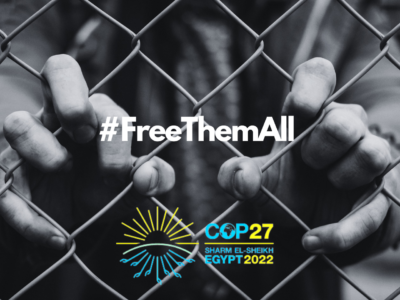
Image courtesy of Sydney Allen via Canva. Photo courtesy of Flickr via (CC BY-NC-ND 2.0)
Last year’s 2021 United Nations Climate Change Conference (COP26 UN) in Glasgow, UK, was a momentous occasion. Over 140 nations pledged to end deforestation in their countries by 2030; wealthy nations agreed to fund climate initiatives in low-income countries most affected by the climate crisis; and Indigenous activists, even as they were overlooked by officials at the conference, rallied defiantly in protest and demonstrations to show the world “We are not drowning! We are fighting!” The event seemingly got an abundance of media coverage and attention — likely because it was one of the first major international events since the start of the COVID-19 pandemic in March 2020.
However, this year, much of that excitement seems to have dissipated. This year’s UN Climate Conference, COP27, is taking place in the seaside resort town of Sharm El Sheikh, Egypt. It's occurring against the backdrop of unprecedented climate disasters, as nations around the world weather record-breaking heatwaves; face immense, unseasonable storms, hurricanes, and typhoons; endure droughts in some regions and devastating floods in others; and more.
Just last month, in October 2022, massive flooding destroyed infrastructure and homes in Australia; landslides took down bridges and roads and left multiple dead in Indonesia, and fires wiped out entire communities. Those who are experiencing these disasters firsthand know the truth. This is a crisis. However, as a spate of other international crises and conflicts garner airtime and attention, a defeated and compassion-fatigued public often struggles to find the urgency to face the massive problem that is our ever-warming planet.
The host of this year’s event, Egypt, has also been accused of using the event to gloss over its human rights abuses — including the jailing of hundreds of environmental activists, crackdown on civil societies, unlawful deportations and detainments, and more.
Many Egyptian civil society workers report that they have been barred from the conference, and activists are accusing the government of attempting to greenwash its abysmal environmental and human rights records by touting its host status this year.
To make matters worse, this year’s event is being sponsored by one of the world’s top plastic polluters, the Coca-Cola corporation, in a move, environmental activists call absolutely “baffling.”
In order to shine a light on the human rights abuses, greenwashing, and elitism pervading much of these climate discussions, Global Voices will release a special coverage, with a particular focus on sharing Indigenous narratives, stories of climate resistance, and the intersection between human rights and environmental justice. See our coverage below.
Stories about Global greenwashing and COP27
Rasha Azab and her friends: Seven days off-script for three Egyptian journalists
Three women journalists staged a sit-in to remind the Egyptian Journalists Syndicate of its role in relation to political discourse and freedom of expression under President Abdel Fattah
‘Global South’ countries declare COP27 a case of climate inaction
With just one day left in the global conference, there still has not been the establishment of a Loss and Damage funding facility as developed nations tiptoe around the agenda item.
Young Indigenous women from Mexico and Morocco unite for COP27
Women of Purépecha and Amazigh descent fight for the land of their ancestors and everyone's climate
Mozambique, Africa's most climate-vulnerable country, calls for more action at COP27
Mozambique has been in an increasingly delicate situation compared to the countries that pollute the most in the world.
Egypt faces a human rights crisis as COP27 begins
COP27's agenda is at risk of being detailed by the host nation's deteriorating human rights record and crackdown on civic space.
Egypt’s systemic greenwashing is sabotaging COP27 before it begins
While thousands of environmentalists, politicians, and scientists from all over the world converge on Egypt to attend COP27, the government is barring local civil society workers and activists from attending.
Coca-Cola, the world’s largest plastic polluter, is sponsoring COP27. Here’s why that’s a problem
In a massive feat of irony, Coca-cola, the world’s largest plastic polluter, is sponsoring COP27, the world’s largest annual environmental conference, which will take place in Sharm El Sheikh, Egypt this month.








